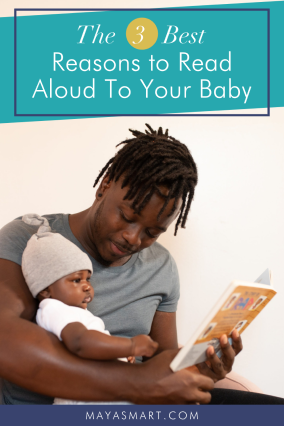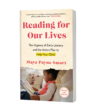Book enthusiasts have long credited family reading with healing and restorative properties, calling it a “magical elixir” or a “super multivitamin” for a range of personal and social issues. As the world-upending first year of COVID, 2020, yawned to an end, one mom even declared that families reading aloud just might be “the panacea the world is looking for right now.” In her estimation, reading with kids just a few minutes a day could combat feelings of defeat and allow parents to claim a much-needed victory.
While extolling the virtues of reading together for bolstering character and resilience, plus remedying the ills of digital distraction and social fragmentation, it’s easy to skip right over its greatest power—seeding early literacy.
Read on for a few science-backed insights into how sharing reading from day one boosts brain capacity, stimulates language development, and spurs vocabulary growth.
Build Brain Networks
For a clear illustration of how brain architecture emerges—and how it lays the foundation for all future learning—check out this video from the Harvard Center for the Developing Child. It shows how brains are built from the bottom up, as millions of new neural connections form in the first few years of life.
Genes affect brain development, but experiences like back-and-forth conversations and interactions between children and caregivers play a powerful role as well. Parents’ exchanges with children, and responsiveness to them, bolster certain brain connections through repeated use, while allowing others to wither from neglect. This ongoing process of brain-circuit reinforcement and pruning continues throughout life, but experts agree that the earliest years have outsized influence.
Humans are not hardwired to read, so in order to gain literacy each brain has to recruit and redirect circuits and networks built for other purposes. For example, the reading brain may co-opt systems originally evolved for vision, oral language, and working memory. This dynamic process requires years of gradual capacity-building through activities that stimulate a child’s brain—including parent-child talking, singing, and reading—starting in infancy.
Reading aloud, in particular, is widely considered to be the difference-maker for early literacy development. The American Academy of Pediatrics urges doctors to promote family reading as a central part of their primary care, from babyhood through at least kindergarten. Reading regularly with kids isn’t just good for young children, the academy’s report notes, it “stimulates optimal patterns of brain development.” That’s high praise.
The time of greatest potential to wire the brain for reading occurs in the first five years of a child’s life, when the brain is most flexible, experts say. Scientists have been increasingly studying the brain activity of young children, thanks to new technology and research methods. And their brain activation research has found encouraging signs that frequent reading aloud to little ones can positively impact the brain function necessary to support reading. In more technical terms, they found preliminary positive associations with brain function relating to visual imagery, expressive language, narrative comprehension, and word understanding.
Boost Language Skills
While an infant won’t be able to point to print or murmur words at first, rest assured that reading aloud still benefits them. Researchers say eye contact, cooing, snuggling into the parent, and reaching for books are telltale signs your baby is engaged in the experience.
As a parent, you be the judge. Tune into your baby while reading. Does she gaze at you while you read? Or grab for the book or your hand as you turn a page? Does he babble more during readings of familiar stories?
One study found that read-alouds with babies as young as eight months old have a direct impact on kids’ ability to express themselves at 12 or 16 months. The one-year-olds and 16-month-olds who’d been read to as younger babies were better able to imitate words, speak words, name objects, and use gestures and words to make requests.
They were also more likely to imitate parents’ patterns of intonation, use consistent sound combinations for people or objects, and make good use of the word “no.” (A key, if somewhat dreaded, linguistic step for toddlers.)
Another study found a difference when moms (sorry, no dads were included in this research) directed more questions to their 10-month-olds while reading stories. These moms had children with better language skills at 18 months old than mothers who hadn’t engaged with shared books in this way.
The toddlers who had been peppered with questions like What’s that? Where’s the doggy? Do you wanna turn the pages? Ready? during storytime as babies showed greater ability to understand what others said to them when they were a year and a half. They also showed a higher capacity to communicate their needs, thoughts, and ideas using words, phrases, and gestures.
So, there’s great value in reading books and asking related questions, even before kids start talking and can provide full-fledged answers themselves. How does that sound? (Read 7 Guaranteed Ways to Engage Kids with Family Read-Alouds for tips on doing this kind of enriched reading aloud to your little one.)
Accelerate Vocabulary Growth
In the course of a day with babies, parents typically spend time preparing and serving meals, giving baths, playing with toys, singing and rhyming, and reading stories.
But of all the activities shared, reading has the distinction of being simultaneously the most valuable for vocabulary enrichment and the least-commonly performed activity, experts say. Read-alouds, on average, account for just 1-2 percent of everyday baby life.
Read-alouds prompt significantly more parent-child language and engagement than other household activities. The language structure and vocabulary in books is often more sophisticated than the everyday language parents use with infants and small kids.
Additionally, the language used around the book—in discussing illustrations, relating stories to the child’s experience, or asking questions—is also more advanced. All of this stretches your baby’s vocabulary exposure in incredibly valuable ways.
And, amazingly, reading done with babies seems to continue to fuel their vocabulary growth long afterward. Researchers found that infants’ levels of attention during book-reading correlated with their vocabulary knowledge at school entry years later.
Another study reports that parent-toddler book reading positively links with the range of words that a child can understand and respond to in the fourth grade. Wow.
An element of direct teaching is in play here. Parents sometimes call attention to a particular word by pointing to it, provide word definitions on the fly while reading, or repeat less-familiar words for emphasis. In a meta-analysis of word learning through read-alouds, more interactive reading styles were shown to boost vocabulary growth.
In short, read early, often, and engagingly to get your baby off to a smart start.
Pin Me for Reference :



